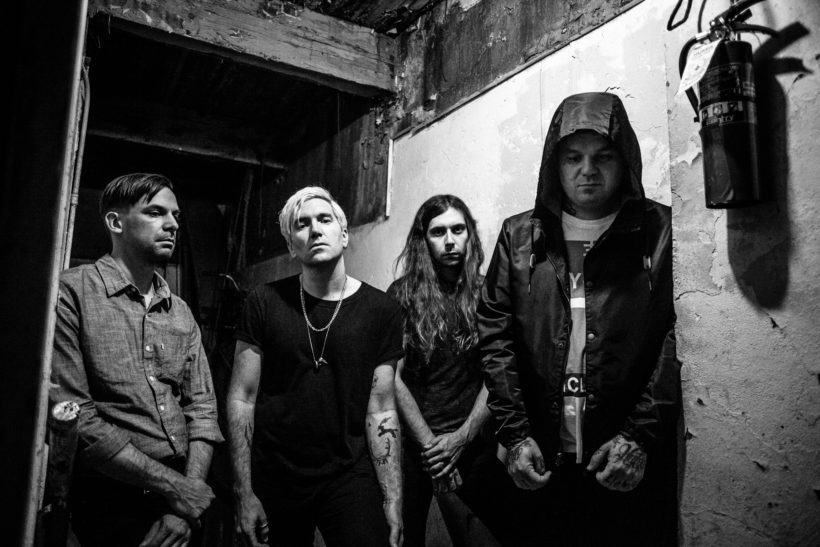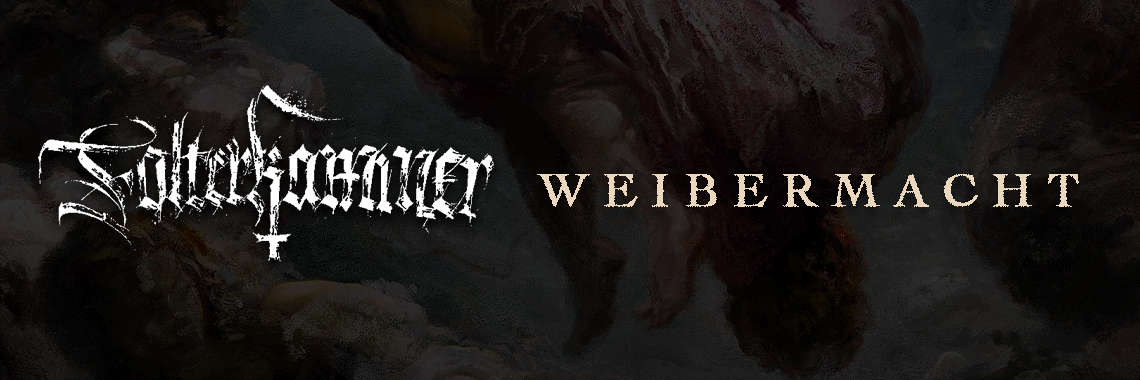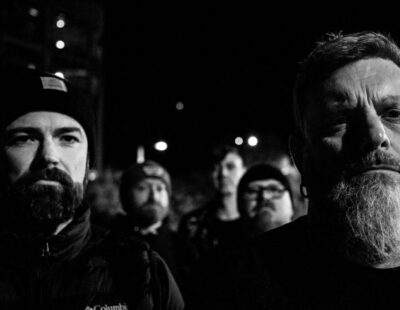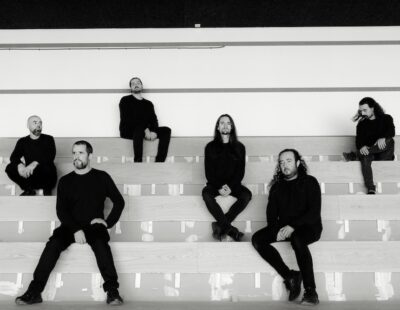
Tobias Grave’s life just a few years ago was predictably chaotic: addiction, prison, touring and writing music. Of all those things, addiction stole the most time. As he finished a successful tour for Soft Kill’s last album Choke and struggled with newfound sobriety his life took a huge turn. Grave’s partner Nicole was rushed to the hospital while they were on the road and gave birth to their son, Dominick. Dominick moved to neonatal intensive care as his mother recovered. Dominick’s life in the early going was touch-and-go and there were instances where it appeared he might not survive. To deal with the pain without resorting to self-medication, Grave spent his spare time away from the hospital writing new music. His entire life was laid out for him to review in a hotel room: poor choices, regrets, dreams, hopes for his son. The end result of that process was the deeply personal and extraordinarily moving new album Savior, released by Profound Lore today. Grave’s son is now a healthy toddler but the memories longer. Grave talked to us about how his toughest moments led to his best work.
What happened on the night your partner ended up checking into the hospital?
Anyone who knows Nicole knows she does what she wants. She was about eight months pregnant and should have stayed home but decided to come out for the last days of our tour. She didn’t want to have our baby in Chicago because of some uncomfortable experiences with the doctor there. We’re a poor couple and need to go through state funding for these sorts of things. We decided to have the baby at home in Oregon. We had two really triumphant Sothern California gigs – it’s sort of like our second home. The next day, we got into the van to drive to Portland and were around Lost Hills. It’s actually near the place where we had our first kiss. When we went to get gas her seat was covered with blood. We quickly realized that we should go to Sacramento because other hospitals might not be able to help. Nicole has placenta previa which means the placenta is blocking the birth canal. She had some bleeding before during the pregnancy and we’d go to the hospital and she would be OK. When we got to the hospital this time they said we need to have this baby right now. We had no idea what was to come. I was dressed up in this hospital garb and I went in and watched them take my son out (via c-section). When they put him on the table you could see him gasping for air. He couldn’t breathe on his own. Their (the doctors and nurses) demeanor quickly changed and they realized they needed to get the baby to the NICU (neonatal intensive care unit). The next day, I was able to take Nicole up in a wheelchair to see him. When we were up there he flatlined and the entire room transformed and it seemed like the entire medical staff was there trying to save his life.
When you are there to experience something as uplifting as childbirth and it becomes a life and death situation how do you manage?
I was wearing these goggles and a mask and I was weeping. My whole personal narrative has dealt with being addicted to drugs. I selfishly went to thinking I was being punished and this was almost like a TV show. I stepped outside of what was happening but I had to keep pulling myself back in. I said to myself: “This is my son. Our son is on this table. This is real and it has nothing to do with you. You need to be strong for this child.” Nicole was recovering after having her stomach cut open. I can’t even pretend that we cowered through gracefully. One of the most vivid memories I have of this is that they were stabbing tubes in his chest to get oxygen into his popped lungs. The social worker was standing next to us. The main doctor usually doesn’t touch the babies and he pushed everyone aside. The social worker looked at us and asked us: “what is your religious preference?” I remember Nicole looked at me and it was just the most devastating moment of my life.
The big upside is that your son recovered. But you ended up in a protracted period living in and around the hospital at UC Davis visiting your son and helping Nicole recover. At what point did you decide to write music? Was it a necessity to stay sane with what you were going through?
Well, being in Sacramento meant we were removed from everyone around us. My Mom came down the second day and I just said: “you need to take me to a Guitar Center.” I had my laptop. One of my friends brought a bass. I had to do something because my son was on the incubator for so many hours. I didn’t want to just loom in the hospital. Luckily I had some of my pedals because I had essentially walked out of the tour van into the hospital. The first thing that I recorded became two songs – it was this nine-minute thing called “Bunny Room/Savior.” The bunny room was where they were housing him in the NICU. Everything pouring out was autographical and not forced. I didn’t feel like I had to change things sonically or lyrically. It was the most purely therapeutic thing and I finished 13 songs.
The easy answer was that I had to do it. It was like I looked at a wall and said: “I could go get drugs or pour my pain out this way.” I had to suppress it one of two ways.
Choose Your Path
Was the temptation to go back to your old life pretty strong?
There almost seemed to be this collective mindset that if our son didn’t make it neither would we. Both of us are recovering drug addicts. I had next to no time sober at that point. I found out she was pregnant with Dominick a month after I stopped using crystal meth which was the last big drug hurdle I had after being a heroin addict for many years. For me to be there for Dominick and Nicole I needed to take that urge and channel it. It’s almost like I wrote the music to level myself so I could meet the rest of my needs. Drug addiction is obviously selfish because medicating yourself is goal number one every day. Everything else is an extension of how you feel after you’ve done that. I had to break that mindset that was familiar for so long. I started using at 20 and I was 34 when my son was born. The music became a way to put this pain somewhere so I could get back into that room to see him.
The choice is very stark. On one side you have a life with your family going forward and on the other, 14 years of difficulties. It’s like having to choose your path.
When I look back at this time and music I remember everything. I do the majority of writing for the band. On some of the old records, I can remember moments but a lot of it is a blur. On this record, I can go to every word and every song and know how I was feeling when I wrote it. The whole narrative is this is a beginning of a new world. This will require strength you’ve never channeled. That’s the theme of the whole record – that I am dealing with both paths. It wasn’t something I thought anyone would hear. Sometimes I think I was almost too honest. When you look at the lyrics they revealed more than ever but there is nothing I’m not comfortable touching on.
Ultimately, doesn’t moving forward require that radical honesty?
That is so true. I think being honest sort of helps you get over your own shit. If I hadn’t had this process of putting out this music I might have relapsed and fallen back into that black hole.
There are dark, minor-sounding songs and upbeat songs. I like the balance of new life on one side and the darkness on the other.
This kind of music can have a limited palate and a lot of people emulate what Joy Division, Bauhaus or The Cure have offered. Since I wasn’t specifically writing a Soft Kill record a lot of the riffs and even the chords were completely removed from what I normally bring to the table. Sequencing an album is so important. I’ve always been obsessed with how a record is laid out. You want something to give you goosebumps on the opening note. When I decided this was a Soft Kill record the sequencing was integral to taking you on the journey of what we went through.
Admittedly this is a very personal album and you approached it from a different mindset. How did the band react?
Initially, I sent each finished piece to the band members. Considering the place we were in not sure they would have said: “that’s a shit song” The entire time they kept thinking it was the best stuff I’d ever written. My ego wasn’t in a place to feed off that. When we finally got home and Dom was fine I went through everything and realized it was the strongest body of work we’d written. There was a lot of support. There were no conflicts. They realized that it was a document of what we went through and it needed to exist.
A New Life
When you deal with addiction and prison time there is an element of self-loathing, right? Then you put something very personal out into the world and people embrace it. What is that like?
I spent every single moment I’ve created something before this thinking about who was going to be a naysayer and who was going to shoot it down. Who would decide that because I went to prison that it would disqualify me from playing? When we were in the hospital a friend put out a GoFundMe that helped us float and survive. It made me realize that I’d focused on everyone but the core fan base. I was focused on peers that I had fallen out with. I thought they held some power. I’d been ignoring the fact that there are people out there who buy and listen to your records. It helped change my mind and I was able to start thinking more about the fans of the music. Months later I was in Europe and people came up and asked about Dominick. I realized then that the general nature of the world is compassionate. I did a disservice to myself by focusing on the ego instead of having a healthy relationship with my music and the people who take time to buy it. As the singles have come out people have validated that I made a good choice by being vulnerable enough to share this stuff.
How are you juggling the band with your fatherhood?
I just did my first big tour which was a 50-day run. We worked it out so that Nicole watched him a lot and grandma came out for about a week-and-a-half. Ultimately he’s at the age where he requires both parents. That’s the big hurdle we are having. If you really want to do something with a band it becomes a full-time job. You have to bust your fucking ass. Balancing these two things is something I hope to master. But right now it’s trial-and-error. I’m not sure we need to keep pushing as hard as we’ve been pushing but that does help get the leverage to make finances easier. We have grandparents that adore him and want to spend as much as possible but I need to be there.
You’ve dealt with prison and addiction. What did you learn from those challenges that helped with fatherhood?
Overcoming addiction was hard. Prison is a very political environment. When you learn politics it’s possible to survive. I’d been getting locked up off and on. I was doing drugs and living one hundred percent off of crime. I would only pay for gas and then I’d rob places like Apple and Barnes and Noble every single day to stay high. When you live a life of crime you end up hanging out with some hardcore motherfuckers. I gravitated to places like Compton and Lynwood and Chicago with a lot of gang members. That was my peer group. Once you devote your life to drugs you will get involved with crime, and if you devote your life to crime guns will come into play. I was there for many years, seeking a family within gangs. When you are strung out robbing doesn’t seem like that big of a deal because ending up sick is way worse. (With addiction) you always get locked up. No one gets out unscathed. I learned that the hard way. I had to accept the addiction as a disease. It takes constant treatment. You need to ignore the naysayers. I had to look at my upbringing and the fact that both of my parents were addicts. I realized this was going to take daily work. I have to keep my mind open to learn from all of these experiences.
With fatherhood, there are a lot of small steps like how do I prepare good food? How do I lay out his day so he gets a full cycle of sleep each night? The thing that being in prison, being an addict and being a father have in common is that they are all full-time jobs.
With the exception that the long-term outlook of fatherhood is better than the other options.
Yesterday I watched him interact with his toys and speak gibberish. I was in awe of it. It was the first time as a father I was really proud of what we have done and enjoyed it without stress and fear. I’ve accepted in the past month that I have my own selfish goals with my music but I want to give him a good foundation.







